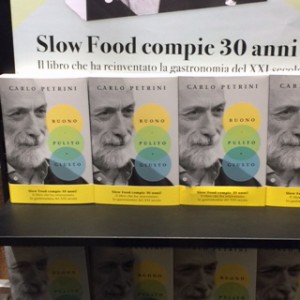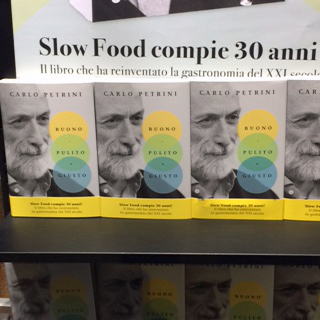 Italians get the food=health connection as a natural everyday behavior. So it’s no surprise that one of the fast-selling books in Italy’s librerias is about Slow Food – a movement that’s celebrating its 30th anniversary in that hot book by Carlo Petrini, a father of the Slow Food organization.
Italians get the food=health connection as a natural everyday behavior. So it’s no surprise that one of the fast-selling books in Italy’s librerias is about Slow Food – a movement that’s celebrating its 30th anniversary in that hot book by Carlo Petrini, a father of the Slow Food organization.
I took the photograph this evening peering into a shop window during our post-dinner walk along the Via Gucciardini past the Giunti al Punto bookstore.
[In full transparency, I’ve been a long-time member of this organization, represented by the little red snail icon.]
The book has a three-word title: Buono, Pulito, Giusto. This roughly translates to “good” (as in good and tasty food); “clean” (as in healthy, safe ingredients that bolster biodiversity); and, “just,” for a human-centered, equitable food system. The book was first published in 2007, and this is an update to celebrate the organization’s three decade birthday. Since its initial publication, the book has even more importance in 2016 and beyond.
 Central to this three-word message is Petrini’s commitment to the “zero kilometer” approach to food. In Italy, for example, olive oil made in Tuscany is used in Tuscan kitchens. Vegetables grown in Liguria go into Ligurian cooking, and so on.
Central to this three-word message is Petrini’s commitment to the “zero kilometer” approach to food. In Italy, for example, olive oil made in Tuscany is used in Tuscan kitchens. Vegetables grown in Liguria go into Ligurian cooking, and so on.
For American foodies, this may sound like the “farm to table” concept, and it is. But in Italy it’s not a special new-new thing that needs a clever name. This is just how people live, cook and eat as a natural life-flow. And this approach greatly contributes to the health outcomes enjoyed by Italian health citizens which I wrote about in Health Populi earlier this week, For Health, Viva Italia!
The Boston Globe also covered this food phenomenon in the 2015 article, In Italy, “Zero Kilometer” Cooking.
Health Populi’s Hot Points: Were Americans to adopt the Italian way of food-life, the U.S. rate of non-communicable diseases such as type 2 diabetes and heart disease would radically reduce, and health care costs per capita would fall.
There are encouraging signs that on the food supply side, U.S. food retailers and producers are moving in this direction — slowly, slowly, but in the direction of, if not “zero” kilometers, more biodiversity, cleaner, and fresher food for more people to access. The news items that Costco, Target and Walmart will go cage-free with eggs, and Campbell’s will support for mandatory labeling of GMOs, provide encouraging signs for America’s health consumers.
Consider the implications of Petrini’s three magic words: Buono (good/quality), Pulito (clean/safe), Giusto (just/equitable). They have as much relevance to U.S. health care as they do to food.
Next week I’ll be in London for work, and I’ll have a post here in Health Populi thinking about what the U.S. Health system can learn from the National Health Service.





 Interviewed live on BNN Bloomberg (Canada) on the market for GLP-1 drugs for weight loss and their impact on both the health care system and consumer goods and services -- notably, food, nutrition, retail health, gyms, and other sectors.
Interviewed live on BNN Bloomberg (Canada) on the market for GLP-1 drugs for weight loss and their impact on both the health care system and consumer goods and services -- notably, food, nutrition, retail health, gyms, and other sectors. Thank you, Feedspot, for
Thank you, Feedspot, for  As you may know, I have been splitting work- and living-time between the U.S. and the E.U., most recently living in and working from Brussels. In the month of September 2024, I'll be splitting time between London and other parts of the U.K., and Italy where I'll be working with clients on consumer health, self-care and home care focused on food-as-medicine, digital health, business and scenario planning for the future...
As you may know, I have been splitting work- and living-time between the U.S. and the E.U., most recently living in and working from Brussels. In the month of September 2024, I'll be splitting time between London and other parts of the U.K., and Italy where I'll be working with clients on consumer health, self-care and home care focused on food-as-medicine, digital health, business and scenario planning for the future...